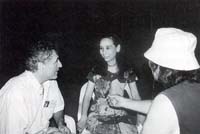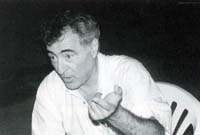AN INTERVIEW WITH
ERIKA AKOH AND ALKIS RAFTIS
SERIES NUMBER TWO
The difference between a spectacleand a drama in the dance
Interviewer Takashi Iijima
Engaged in Greek Dance
- Akoh:
- You have been engaged many years with greek Dance at Dora Stratou Theater and I think it should be a very tough job. What led you to this field?
- Prof.Raftis:
- I am doing this job with pleasure. Dance is a movement in itself. Even though we can go very deep about dance, dance itself is a form of movement and I truly perceive it that way.
- Interviewer:
- Are you researching Greek Dance with that principle? But don't you have to track down all the way to ancient Greece?
- Prof.Raftis:
- That's right. I had an interest from long time ago and after graduating the university, I really started studying about Greek Dance. I had started by learning from the villagers who were dancing in villages, group of dancers today and even old villagers. It is the teacher or the chreographer who changes the originality of the dance. I've wanted to go back at least 60 to 70 years ago so that I can see the original movement of the dance with my eyes. The research materials that I used were from books; photographs; drawings; lithographs; illustrations; and way before the printing technique was developed, I've used papyrus and relics; excavated marble with carved dancers and mural paintings. By going through these materials very carefully, I got to know about the era when Turks occupied; Roman, Byzantine Era; and the ancient Greek era. I think I've throughly covered the history of Greek Dance.

- Interviewer:
- I've gone through your career history.
- Prof.Raftis:
- I had graduated from 4 universities. I had taught at 4 universities and furthermore 14 universities in all after that.
- Interviewer:
- You had graduated from Paris University. What was your major?
- Prof.Raftis:
- In Greece, I majored in engineering. At Paris No.8 University, I majored in Political Science and Management. Therefore I received 4 different degrees but a couple of years ago I completely retired from teaching and concentrating on my research now.
- Akoh:
- I am in great honor to have met such a wonderful person. I personally feel that I must study more myself to improve and inspire the audience through my performance. I'm very fortunate to be supported by Prof. Raftis.
- Interviewer:
- During the summer, there are constantly 3-4 groups performing Greek Dance everyday at your Dora Stratou Theater. The performers who danced today said that they came from a village one thousand kilometers away.
- Prof.Raftis:
- That's right. After the performance, they go home another one thousand kilometers.
- Interviewer:
- How many dance groups are there in Greece?
- Prof.Raftis:
- The population in Greece is ten million, and there are about ten thousand villages. And there are about 4 thousand dance groups. But I don't invite individual dance groups. I invite the villagers. They don't learn their dance from teachers or a chreographer. Through their life they dance the Greek Dance which is passed on to the next generation; parents to their child; grandparents to their grandchildren. This conference is said to have its distinct nature. Only Erika Akoh's group is invited to perform as a dance group.
- Akoh:
- Then, I want to know why you had invited me to perform in an only Greek Dance performers. And you haven't even seen me dance and decided to invite me. I want to hear from you what are the expectations from my dance.
- Interviewer:
- I am very interested to hear your reply. The answer to this question would be on the next issue.

Born in 1942; Athens, Greece. After graduating a Greek University, studied Sociology at Paris No.8 University (Vincennes), Ecole Pratik (EHESS),and furthermore studied at the National Folk Dance Seminar in France, Lyceum of Greek Women, the Dora Stratou, and Nellu Dimoglou group.
After returning to Greece, completed a research of the Historical Ethnology of the villages in Greece. Published many books on what he researched. Wrote initiation to "Greece" for the Dance Encyclopedia (N.Y.), "Dance in Poetry", "The World of Dance", and many other dance related books are to his credit. The establishing member of the "Legendary Dance Center". And currently a chairman of The International Folk Art Organization and President of the International Dance Coucil (CID-UNESCO).
Takashi Iijima (Interviewer)Born in 1949; Manchuria, China. Graduated Seijyo University Art and Literature Course. Studied under Shimako Mural (Director), Mitsuya Mouri (Theatrical Studies). Went on a journey over 7 years span to Africa (Kenya, Tanzania, Uganda, Nigeria), North and South Europe, and North America. After breaking up of "Kaze Yashiki", participated in the establishment of "No.7 Hospital Ward Theatrical Company", (but later resigned due to sickness).
Advisor of The World Chorus Union, The Japanese representative of many International Exchange Organizations, A guest professor at universities (immediately removed from teaching), and currently a representative of Tess Culture Center, International Division Director of the World Ballet and Modern Dance Competition, Member of the Japanese Theatrical Society, and freelance performance director. Residing in Inadani, Nagano. Performance Directing History: "Lady Julie", "Match Selling Girl", "Dear,Dear Grouching Poor", "Fox and Grape", "Waiting Room", "Dead in the Morning","Zoo Story", "When Winter comes Spring is yet to come", "To Dream at Dusk", and "Introduction to Spring), etc,.

